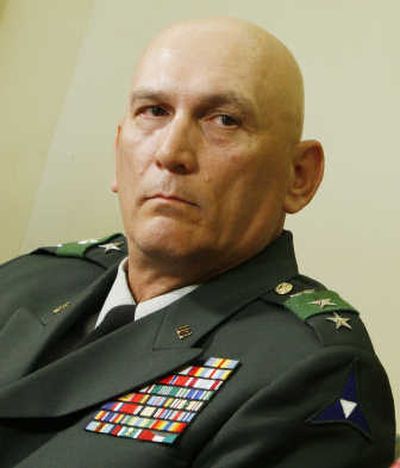Petraeus promotion will reinforce Bush Iraq policy

WASHINGTON – In promoting Gen. David Petraeus to commander of U.S. forces in the Middle East, President Bush is doing more than rewarding a job well done in Iraq. The president also is taking a step toward perpetuating his policy of high troop levels in Iraq and is putting his most trusted general in charge of renewing the military’s focus on Iran.
Petraeus has been the prime advocate of Bush’s policy of a large troop presence in Iraq. By naming Petraeus to a job that lasts into the next administration, Bush ensures that the new president will confront the military’s strongest voice for maintaining a big force in Iraq.
Petraeus also has emerged as a leading critic of Iran’s interference in Iraq, making his appointment a signal of heightened U.S. attention to Tehran. His expertise with Iran’s military and political leadership will allow him to take a more hands-on approach to dealing with the government.
Defense Secretary Robert Gates said Wednesday that Bush will nominate Petraeus to take over as chief of U.S. Central Command, which also oversees Afghanistan and Pakistan. The job was left vacant in March when Navy Adm. William Fallon stepped down after appearing to criticize U.S. policy in the region, especially on Iran.
At the same time, Gates said Bush will nominate Lt. Gen. Raymond Odierno to take over Petraeus’ current job as top U.S. commander in Iraq. Odierno served under Petraeus as day-to-day Iraq commander before stepping down in February. Like Petraeus, Odierno has urged that Pentagon leaders and policymakers approach U.S. troop reductions cautiously to avoid creating gaps in Iraq’s fragile security.
Both officers must await Senate confirmation. Although confirmation hearings will be confrontational, with Democrats criticizing Bush’s war policy, both men figure to be approved. Despite the policy disagreements, Petraeus and Odierno command respect because of their success in reducing levels of violence in Iraq.
During his time as Iraq commander, Petraeus has grown steadily more critical of Iranian interference in Iraq’s politics and of its role in contributing to violence.
When he took command of U.S. forces in Iraq in 2006, Petraeus was surprised at the extent of Iranian meddling, said some who have worked with him. During recent appearances in Washington, Petraeus highlighted “nefarious activities” by Iran’s Al Quds Force and charged the unit has armed Iraqi “special groups” that have killed U.S. soldiers.
“We should all watch Iranian actions closely in the weeks and months ahead, as they will show the kind of relationship Iran wishes to have with its neighbor,” Petraeus told Congress.
But Petraeus also has displayed a keen understanding of the current Iranian government, and many said he would approach Tehran with reserve.
In his new post, Petraeus will have a chance to solve a problem that, before now, he and others could only complain about.
“The question is not if Iran is unhelpful in Iraq,” said P.J. Crowley, a retired Air Force colonel and a fellow at the Center for American Progress. “The question is what to do about it.”